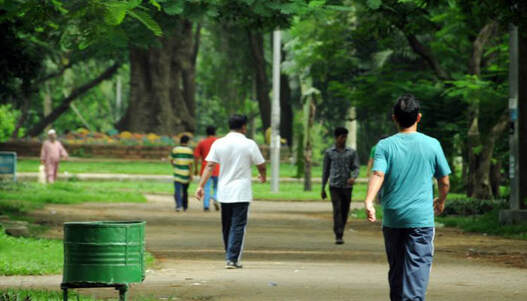 Benefits of an Early-morning Walk in the Park are Endless Benefits of an Early-morning Walk in the Park are Endless Heart disease and cancer take the center stage while diabetes and blood pressure are deemed to be a standard mishap in every man’s life where a physician’s routine questionnaire during any consultation involves a pointer on these two conditions. Still, I guess there are some who are unaware of the changes to BP guideline introduced in 2017 (normal BP readings now are 130/80 mmHg). Despite high blood pressure levels being considered as a silent killer, we do indulge in salty French fries, spray salt to even our salads and eat all the processed foods that we can lay our hands upon. It would be ridiculous to ask someone to cut off access to salt once they are diagnosed with BP and neither are we doing justice when we generously grant our kids access to their favorite potato wafers or French fries. An Algorithm for BP Treatment Once high blood pressure levels are confirmed in any patient the physician’s first advise would be changes to the patient’s food habits. Do’s and don’ts are listed, physical activity prioritized and a healthy lifestyle change brought into picture. But how many of us adhere to such changes immediately or without being affected by an even greater mishap? Not many. Understanding that high BP levels are avoidable in the first place by our attitude towards life and coming forward to make appropriate changes once diagnosed with the condition shows your respect for your health and adherence to certain principles of life that would make life smoother, easier, livable and more enjoyable. The algorithm suggested by the American Medical Association provides a great insight for the patients on the changes that need to be brought into their life whereas it serves as the perfect tool for physicians to take the patient in the right path towards better health: Normal BP: 120/80 mmHg is considered to be normal BP readings and when individuals are well-under this range all that they are advised to do is adhere to healthy lifestyle habits such as a nutritious diet and regular exercise. Though ranges might be normal a yearly BP assessment helps both the patient and the doctor understand where the individual stands with respect to blood pressure health. Elevated BP: A blood pressure measurement between 120 and 129 mmHg systolic and 80 mmHg diastolic pressure comes under this category. Physicians advise their patients to take up nonpharmacological therapy for treating blood pressure falling under this category. They also promote these individuals to pursue the DASH (dietary approach to stop hypertension) diet, an eating plan that consists of reduced sodium and fat intake, increased produce intake and optimal dairy intake. Following a regular physical activity plan, minimizing alcohol consumption and weight loss (if needed for people belonging to the obese/overweight category) is recommended alongside the diet plan. The physician is advised to also reassess BP measurements every three to six months. Stage 1 hypertension: Individuals with 130-139 mmHg systolic and 80-89 mmHg diastolic are put into this category. The physician is to prescribe BP-lowering meds and nonpharmacological therapy when the patient has a history of clinical atherosclerotic cardiovascular disease, chronic kidney disease, diabetes or a 10-year (or above 10%) cardiovascular disease risk. It is critical to assess BP levels after a month and if there are no changes it is necessary that the doctor intensifies the therapy. In case the risk of cardiovascular disease is less than 10%, nonpharmacological therapy should be recommended with a date set for follow-up after three to six months of therapy. Stage 2 hypertension: For anyone having a blood pressure reading of above 140/90 mmHg the doctor prescribes both nonpharmacological therapy and BP-lowering medications by default. Here also, the readings are taken again after one month and if there are no positive changes in the therapy the physician assesses optimal adherence to therapy and also thinks about intensifying it where the diet restrictions are made stricter and activity levels are also monitored. In whichever stage of hypertension you might be, it is possible to control it with perfectly planned diets available at www.firsteatright.com. Our RDNs expertise in diabetes nutrition would help you optimize BP levels and maintain it without straining your physical health. Comments are closed.
|
AVOID FRAUD. EAT SMART.+91 7846 800 800
AuthorDietitian & Nutritionist Dr. Nafeesa Imteyaz. Archives
November 2022
Categories
All
Dr. Nafeesa's Blog @blogspot |
- Home
- Written Testimonials
- Consult
- Clinics
- Blogs
-
Diet & Nutrition
- Diabetes Reversal
- IVF IUI not needed for PCOS PCOD Infertility
-
Medical Nutrition
>
-
Disease & Conditions
>
- Infertility | PCOS
- Diabetes Mellitus
- Cholesterol
- Hypothyroid
- Kidney Problems
- Hypertension
- Cardiovascular Diseases
- Liver Diseases
- Gastro intestinal disorder
- Cancer
- Metabolic Disorders
- Orthopedic Disorders
- Eating Disorders
- Dietary Recall
- Weight Record Filled By Clients
- Online Payment Transaction Details
- Online Clients Weight Check Form
- Our Program Package Service Charges
- Weight Record 2017 Clients
- Measurements sent by Clients
- Terms & Conditions Of Payment
- Thanks. Your Form is Submitted
- Video Testimonials
- Lifestyle & Wellness
- Lifestyle & Wellness Blog
- Allergy & Intolerance
- Weight Loss / Gain
- Weight Loss / Slimming Blog
-
Disease & Conditions
>
- Life Cycle Nutrition >
- Sports Nutrition >
- Integrity in Nutrition
- Knowledge Centre
© COPYRIGHT 2022. ALL RIGHTS RESERVED. FRST HEALTHCARE PVT LTD.
Dr. Nafeesa Imteyaz of First Eat Right clinic, is the Best Dietitian Nutritionist in Bangalore. Best Dietitian Nutritionist in Pune. Best Dietitian Nutritionist in Hyderabad. Best Dietitian Nutritionist in Chennai. Best Dietitian Nutritionist in Mumbai. Best Dietitian Nutritionist in Delhi. Best Dietitian Nutritionist in Kolkata.


